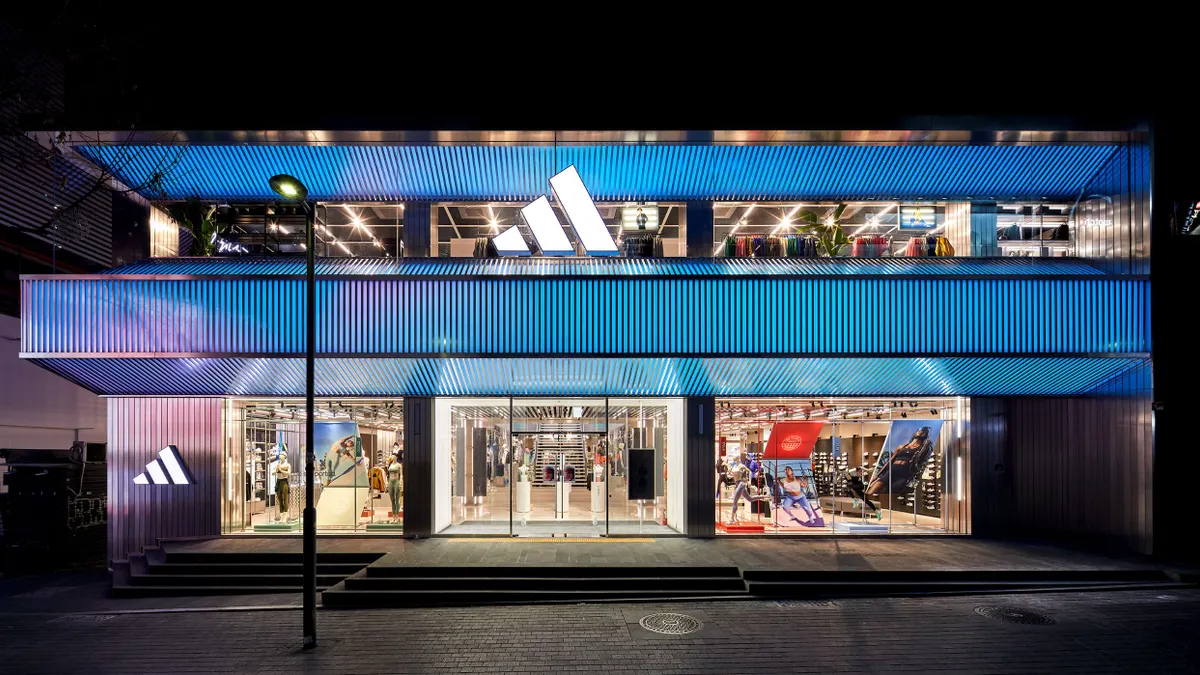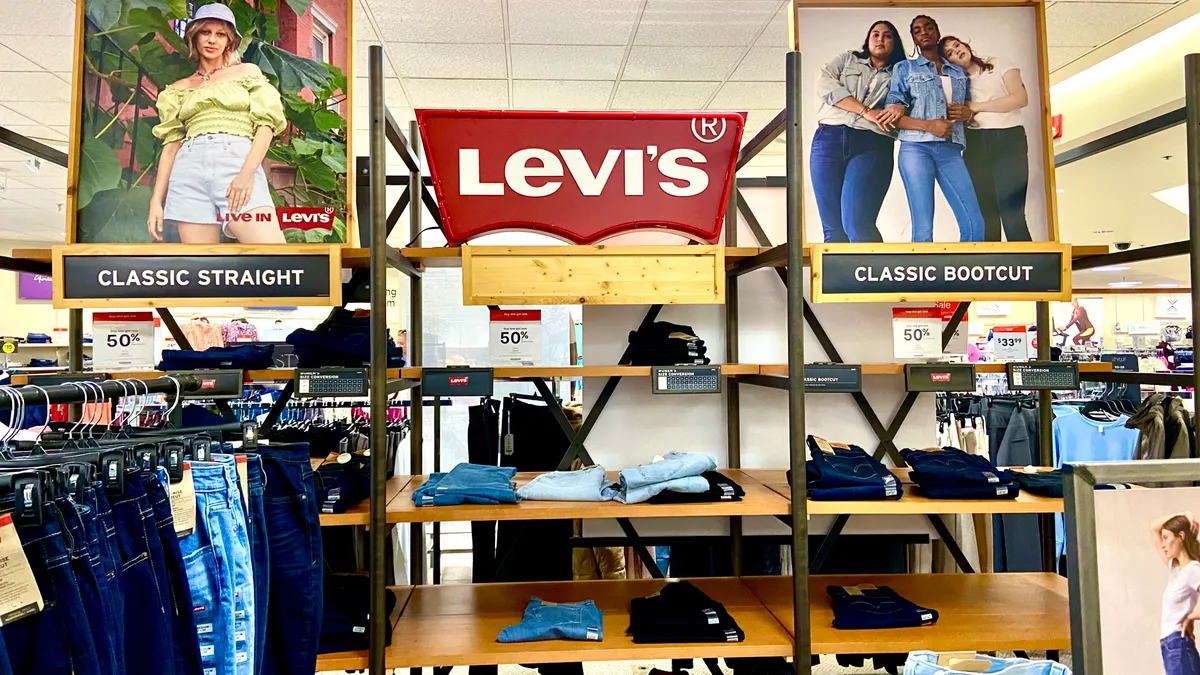Nobody at VF Corporation appears to be thinking about James Dean, the cultural icon who took Lee jeans from cowboys and made them an apparel fixture for young Americans in the mid-20th century.
It's not that executives don't appreciate the iconic nature of its Lee brand, which along with its Wrangler brand is being spun off into a separate publicly traded denim company that executives expect will be worth more than $2.5 billion in annual revenue. VF CEO Steve Rendle even used that word, "iconic," to describe the brands.
The move — which would leave a slimmed-down VF with Vans, The North Face, Smartwool, Timberland and JanSport, among others — is squarely in line with the company's strategic priorities.
"It looks like VF is considering divesting itself of its core denim business much in the same way it sold off its intimate apparel business years ago," Mark Cohen, Columbia Business School retail studies professor, told Retail Dive in an email. "The market value they receive from the growth components of their portfolio is diminished by the drag that this mature segment creates."
VF executives told analysts on a conference call this week that removing Lee and Wrangler from the company's stable was "logical." On its face, that's difficult to argue with.
"The VF denim businesses have been a drag on overall growth and profits, so splitting them out will make the remaining VF business look much better," Matt Powell, vice president and senior industry advisor at The NPD Group, told Retail Dive in an email.
Denim days are over
There's little question that the denim business has taken a back seat to apparel like athlesiure, which people are no longer saving for the gym or yoga studio. It's been a trend line for the past five years, according to Powell. The category has become a catch-all term for high-performance casual wear that Lululemon, arguably, popularized.
"It's not a secret the denim market in the United States has shrunk. Thanks to athleisure and other market dynamics, jeans sales have dropped over 14% the past four years," Ray Hartjen, director of marketing for retail analytics firm RetailNext, told Retail Dive in an email. "With that in mind, it's damn difficult for VF Corp to sell itself as a growth company with so much invested in a mature and, perhaps, declining market."
The denim market is no longer dominated by the labels that for a while sold the world over. First produced well over a century ago, American denim jeans from Lee, Wrangler and Levi's staked their reputations both on practical considerations like durability — they sold to rugged workers like mariners, loggers and cowboys — and, eventually, a mythology, perpetuated in part by the movies.
"Denim is doing well in specialty and at the department stores. However, it is stylized and targeting Get Z/Gen Y. All of VF's denim is not — it's basic and targeting an older customer, and there lies the problem."

Jane Hali
CEO, Jane Hali & Associates
James Dean's and others' embrace of jeans helped expand the myth beyond westerns to American culture more broadly. For a while, denim was the wardrobe staple for America's youth. Each pair was uniquely the wearer's own, faded and shrunk to perfection according to the activities and body of the person who wore them. Today, though, rips, tears and fading are all done at the factory, the fabric stretches thanks to cotton blends, and, in the post-fast fashion era, durability isn't much of a concern.
"Denim is doing well in specialty and at the department stores. However, it is stylized and targeting Get Z/Gen Y," Jane Hali, CEO of investment research firm Jane Hali & Associates, told Retail Dive in an email. "All of VF's denim is not — it's basic and targeting an older customer, and there lies the problem."
VF's other brands are a different story, though, positioned as they are for outdoor, active, lifestyle and work, according to Hali. Beyond the generational divide, though, denim is now more diverse in other ways: Luxury consumers pay top dollar for designer brands, while the rest seek out deals on the trendiest styles.
"The denim business at retail is fine, but it continues to be highly commoditized and price-driven and is also moving more and more each year away from established national brands into private label," Cohen said. "This puts VF under pressure to rationalize what appears to be the ever declining gross margins that the denim business realizes."
While denim isn't a high-growth segment, it nevertheless sells. Athleisure has endured for several years now, but it hasn't exactly stood the test of time the way denim has.
"There's value in denim — just look at Levi's as a proof point," Hartjen said, noting that Wrangler and Lee are solid, if unspectacular, performers. "Sure, sales and profit have fallen in the division for the past several years, but last year the division still posted $2.66 billion in sales and $422 million in profit. How many retailing brands would figuratively give their eyeteeth to post results like that?"
What's next?
The denim spin-off proposal is just one of several moves made at VF in the past couple of years as investors urge growth. "VF has made some great acquisitions and I expect they will make more, focused on outdoors and athleisure," Powell said.
The company last year acquired workwear label Williamson-Dickie, performance wear label Icebreaker and running shoe company Altra. It also sold off Nautica (bought by Authentic Brands) and Licensed Sports Group, including the Majestic brand (bought by Fanatics). In 2016, VF unloaded its contemporary brands businesses — including 7 for All Mankind, Splendid and Ella Moss — to Israeli apparel company Delta Galil Industries for $120 million.
Executives haven't said much about what is next for Lee and Wrangler beyond noting that Scott Baxter, who led VF's denim business from 2011-2015, is to be the new entity's CEO. The jeans company that Lee and Wrangler will form will likely be "a cash cow with some upside still available," Hartjen said, adding that the pressure is on for VF's remaining portfolio of brands. While jettisoning Lee and Wrangler may be obvious from an investor standpoint, some argue the move was too easy.
"Maintaining a venerable brand like Lee or Wrangler is hard work, and in this case, maybe even hard re-work (think Old Spice), so why bother with potentially years of angst when you can just buy another hot brand and throw it on your pile to raise your stock price while dumping your losers?"

Lee Peterson
EVP of brand strategy and design, WD Partners
"VF Corp made the classic 'lazy' play — get rid of the tired, funky brands and stick with the fresh winners," Lee Peterson, executive vice president of brand strategy and design at WD Partners, told Retail Dive in an email. "Maintaining a venerable brand like Lee or Wrangler is hard work, and in this case, maybe even hard re-work (think Old Spice), so why bother with potentially years of angst when you can just buy another hot brand and throw it on your pile to raise your stock price while dumping your losers?"
Lee and Wrangler have plenty of staying power, he added. It's now up to the new entity to realize that.
"There's still a lot of equity in the VF denim brands, and, maybe, with some creativity and imagination, they could be brought back to life in a modern way," Peterson said. "Look at Duluth Trading Company. Their apparel is about a nanosecond from the same brand essence as Wrangler, but someone took a hold of that idea and made it relevant. They're about to open 400 stores."






















